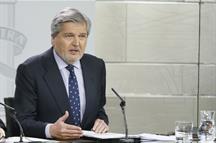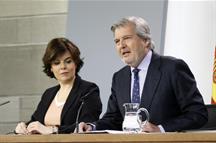Council of Ministers
Government approves Annual Regulatory Plan 2018
Council of Ministers - 2017.12.7
Moncloa Palace, Madrid
The Council of Ministers approved the Annual Regulatory Plan of the General State Administration for the year 2018.
The Vice-President of the Government and Minister for the Presidency and for the Territorial Administrations, Soraya Sáenz de Santamaría, highlighted that this is the first time that the government has approved an instrument of this nature, which places Spain "at the forefront of the European Union and of OECD countries in terms of good and smart regulation".
Soraya Sáenz de Santamaría claimed that the government "is commencing a new way to legislate" that consists of announcing its goals and allowing those affected and the legislative chambers to see which regulations will be drawn up and take part in them. Accordingly, this offers greater transparency to the proceedings and advance warning is given to citizens and economic, legal and social operators alike.
In this regard, the Vice-President of the Government specified that by applying this measure it is possible to avoid discord between different regulations from different ministerial departments. Furthermore, all operators - professional colleges, employers' associations, trade unions and NGOs, among others - will be aware of the legislation that may affect them and pass on to the government their observations and suggestions in advance.
The Vice-President of the Government pointed out that the plan determines which regulations are being planned (287) and which will then be subject to a subsequent assessment (43 legislative bills).
287 regulations in 2018
 Pool Moncloa / JM CuadradoSoraya Sáenz de Santamaría announced that the government intends to draft 287 regulations, of which nine will be Constitutional Laws, 38 will be ordinary Acts of Parliament and 240 will be Royal Decrees, and 52 EU Directives will be transposed. Furthermore, this provides for the potential approval of other legislation, such as those deriving from work of the parliamentary committees in the Lower House of Parliament. "We are fully aware that Parliament may also convey to the government the need to approve draft laws", she said.
Pool Moncloa / JM CuadradoSoraya Sáenz de Santamaría announced that the government intends to draft 287 regulations, of which nine will be Constitutional Laws, 38 will be ordinary Acts of Parliament and 240 will be Royal Decrees, and 52 EU Directives will be transposed. Furthermore, this provides for the potential approval of other legislation, such as those deriving from work of the parliamentary committees in the Lower House of Parliament. "We are fully aware that Parliament may also convey to the government the need to approve draft laws", she said.
The Vice-President of the Government claimed that the government will initiate or continue with drafting this legislation and that during its passage through Parliament will maintain contact with the different political parties, and hence some will become laws and other will not, according to whether there is agreement or not. "The plan is not rigid; it is possible that over the course of the legislature the need will arise to approve other laws", she underlined.
One of the government's priorities is to amend the Law on Comprehensive Protection Measures to Combat Gender-Based Violence, pointed out the Vice-President of the Government, who also highlighted the Law on Minors without Alcohol and the development of the Voluntary Work Act.
Soraya Sáenz de Santamaría also indicated that environmental protection will receive a boost through the drafting of a Climate Change and Energy Transition Act and the Reduction in Greenhouse Gas Act. As regards protecting individual rights, there will be amendments to the Civil, Commercial and Criminal Codes, to the Civil Procedure and Criminal Procedure Acts and to the Constitutional Law on the Judiciary.
Furthermore, the Vice-President of the Government announced that the Law to Prevent Money Laundering and the Financing of Terrorism will be amended and certain aspects of reliable online services will be regulated. Implementing regulations on the Transparency Act and the right to asylum will also be approved.
At a financial level, Soraya Sáenz de Santamaría quoted the Out-of-Court Conflict Resolution Act in the field of finance, the transposition of an EU Directive regulating the Securities Market and the amendment to the Corporate Income Tax Act. At a financial level, she highlighted the changes to the system of regional financing and the law regulating local treasuries, as well as the approval of the General State Budget Acts for the years 2018 and 2019.
UNED lecturers
 Pool Moncloa / JM CuadradoThe Council of Ministers authorised the National Distance Education University (Spanish acronym: UNED) to make a Public Employment Offer for teaching and research staff corresponding to 2017 to cover a total of 117 places, of which 70 correspond to contracted lecturers that hold a PhD and 47 to university lecturers, reported the Minister for Education, Culture and Sport and the Government Spokesperson, Íñigo Méndez de Vigo.
Pool Moncloa / JM CuadradoThe Council of Ministers authorised the National Distance Education University (Spanish acronym: UNED) to make a Public Employment Offer for teaching and research staff corresponding to 2017 to cover a total of 117 places, of which 70 correspond to contracted lecturers that hold a PhD and 47 to university lecturers, reported the Minister for Education, Culture and Sport and the Government Spokesperson, Íñigo Méndez de Vigo.
Defence
On the issue of defence, the government approved the contract to execute works on the fifth large hull of the S-71 "Galerna" class submarine, as well as the contracts deriving from this agreement for a sum of 43.26 million euros.
The Council of Ministers also authorised the signing of a framework agreement to develop activities to support the maintenance of Navy aircraft.
Chief Public Prosecutor
The Council of Ministers agreed to appoint Julián Sánchez Melgar as the new Chief Public Prosecutor to replace the recently deceased José Manuel Maza.
Application of Article 155 in Catalonia
 Pool Moncloa / JM CuadradoÍñigo Méndez de Vigo explained that the Council of Ministers held an extraordinary meeting, called pursuant to the agreement reached at the plenary session of the Upper House of Parliament on 27 October 2017, approving the measures requested by the government within the scope of Article 155 of the Constitution.
Pool Moncloa / JM CuadradoÍñigo Méndez de Vigo explained that the Council of Ministers held an extraordinary meeting, called pursuant to the agreement reached at the plenary session of the Upper House of Parliament on 27 October 2017, approving the measures requested by the government within the scope of Article 155 of the Constitution.
Among the agreements adopted at this meeting, the Government Spokesperson highlighted the approval of 16 agreements to modify loans in the budget of the Regional Government of Catalonia for 2017.
Subsequently, the Government Delegate in this region, Enric Millo, gave further details of these agreements at a press briefing held in Barcelona.
Weekly assessment
Íñigo Méndez de Vigo began his press briefing following the Council of Ministers by expressing his condolences to the family of the former Speaker of the Lower House, Manuel Marín, who passed away on Monday, and to his party colleagues. "He was a very courageous person, he dedicated his political life to the European cause and played a very active role in the negotiations that culminated with Spain joining the European Communities", he said.
Economy
 Pool Moncloa / JM CuadradoThe Government Spokesperson highlighted, among other economic figures published this week, that the social security system has 637,000 new contributors, and hence the total number is now close to 18.5 million. "We are increasingly closer to reaching the figure of 20 million contributors by the year 2020, which is the government's main target". He also underlined that Spain has now spent four years heading up the reduction in unemployment in Europe and economic growth.
Pool Moncloa / JM CuadradoThe Government Spokesperson highlighted, among other economic figures published this week, that the social security system has 637,000 new contributors, and hence the total number is now close to 18.5 million. "We are increasingly closer to reaching the figure of 20 million contributors by the year 2020, which is the government's main target". He also underlined that Spain has now spent four years heading up the reduction in unemployment in Europe and economic growth.
Catalonia
These positive forecasts, according to Íñigo Méndez de Vigo, contrast with the results being posted in Catalonia, with companies continuing to flee the region, a rise in unemployment and a fall in tourism. However, the minister trusts that the recovery will eventually reach Catalonia. In his opinion, "Catalonia makes progress when it shares common goals with Spain, when it is interested in concerning itself with the general interests of citizens and when it acts motivated by a dynamic of integration and not by divisive politics".
The only certainty following the elections to be held on 21 December, declared the minister, is that "there will still be a government that holds out its hand to dialogue, dialogue without deadlines, within the law and to help resolve the problems of its citizens". The government, he added, wants the new President of the Regional Government of Catalonia to be someone who is the president of all the people of Catalonia and not just a part of them, who is capable of dialogue and predisposed towards reaching agreements, and whose policies unite rather than divide".
Current affairs
 Pool Moncloa / JM Cuadrado
Pool Moncloa / JM Cuadrado
When asked about the government's opinion on the demonstration held in Brussels to support Carles Puigdemont, the Vice-President of the Government pointed out that the Spaniards who attended this rally were able to demonstrate precisely because they are European Union citizens, where the right to demonstration exists and is recognised. "The Spanish National Identity Document is what has allowed them to go there and to demonstrate", she stated.
As regards the possibility that, following elections to the Regional Parliament of Catalonia on 21 December, the "independence process" will reignite, Soraya Sáenz de Santamaría recalled that it was the very promoters of independence who have questioned their own maturity and unfeasibility of their project and stressed that "this is what has most harmed" the Catalan community "in the history of our autonomous regions". The social breakdown caused is something that "no political leader should do again". Similarly, she added, the economic situation created "should never again be repeated".
Furthermore, the Vice-President of the Government thanked all the public servants for their collaboration and professionalism, which allowed Article 155 of the Constitution to be applied in Catalonia under "terms of normality". The ordinary administration of the region would not have taken place without their support", she stressed.
The minister and Government Spokesperson confirmed the good disposition of both parties to ensure that the negotiations under way with the representatives of Baroness Carmen Thyssen to extend the presence in Spain of her private collection are completed satisfactorily.
As regards the recent decision by the President of the United States, Donald Trump, to recognise Jerusalem as the capital of the State of Israel, Íñigo Méndez de Vigo stressed that the question is "highly important" and that the solution to the conflict must "unavoidably" include the existence of two states - Israel and Palestine - living side-by-side in peace and security. The government, he concluded, does not want to see anything that "escalates tensions".
Non official translation





